Ted Kaczynski
Ted’s Newspaper Mentions Before His Imprisonment
1958–1980
Circus worker shows telescope to Ted Kaczynski — 1956
Local News of Ted’s Scholarship to Harvard — 1958
We must sit here and take it — Dec 17, 1969
The future may not be that rosy — Jan 10, 1970
The Saturday Review Book Forum — Jan 10, 1970
Snowmobiles only provide short-term thrills — Jan 17, 1970
Letter to the Saturday Evening Review — Feb 28, 1970
Cities are boring people to death — March 23, 1970
Liberty Is In Danger — April 25, 1970
Some politicians want to turn people into robots — May 2, 1970
Why you Canadians should support population control — June 30, 1970
Stick to your traditional values — August 14, 1970
The hypocrisy of oil propaganda — Jan 26, 1971
Ted is fined in Justice court — May 17, 1974
“Woodsman seeks squaw” — Jan 26, 1975
How people will replace machines — Jan 26, 1980
Warning to Berry Pickers and Mushroom Hunters! — August 6, 1989
C0. 19 April 1956 — Chicago Tribune
C2. 1969-12-17 — CHICAGO DAILY NEWS
C3. 1970-01-10 — CHICAGO DAILY NEWS
C4. 1970-01-10 — The Saturday Review
C5. 1970-01-17 — CHICAGO DAILY NEWS
C6. 1970-02-28 — The Saturday Review
C7. 1970-03-23 — CHICAGO DAILY NEWS
C8. 1970-04-25 — CHICAGO DAILY NEWS
C9. 1970-05-02 — CHICAGO DAILY NEWS
C10. 1970-06-13 — The Saturday Review
C11. 1970-06-30 — The Edmonton Journal
C12. 1970-08-14 — THE VANCOUVER SUN
C13. 1971-01-26 — CHICAGO DAILY NEWS
C14. 1974-05-17 — JUSTICE COURT
C15. 1975-01-26 — SAN FRAN EXAMINER AD27560
Here is every newspaper mention of Ted and every essay or advert that was ever published by a newspaper before his imprisonment that isn’t related to his bombing campaign.
The list includes a lonely hearts advert seeking an indigenous wife and a letter in which he writes the phrase that helped secure a search warrant; ‘have your cake and eat it too’ the ‘normal’ way.
Circus worker shows telescope to Ted Kaczynski — 1956
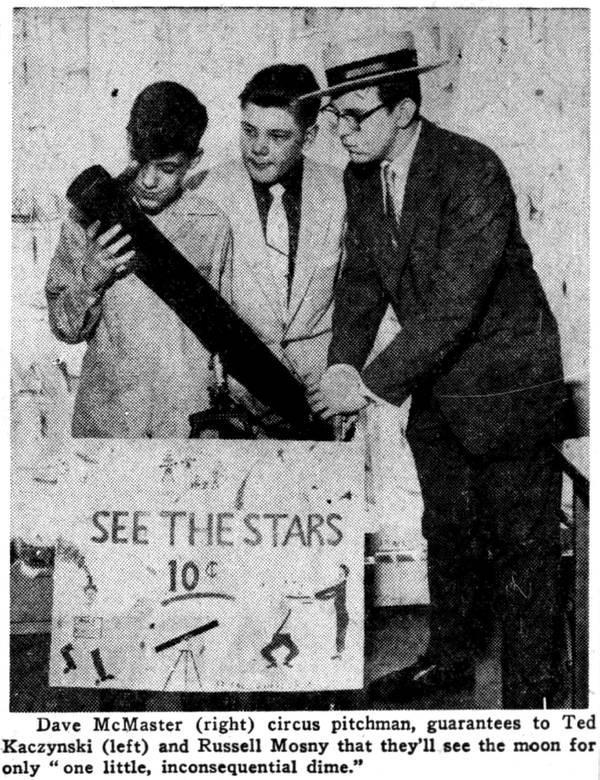
Local News of Ted’s Scholarship to Harvard — 1958
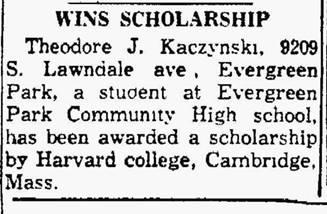
Wins Scholarship
Theodore J. Kaczynski, 9209 S. Lawndale ave, Evergreen Park, a student at Evergreen Park Community High school, has been awarded a scholarship by Harvard college, Cambridge, Mass.
We must sit here and take it — Dec 17, 1969

The worst aspect of such evils as air pollution, DDT and the garbage put on TV is not the actual harm that these things do us; the really galling thing about them is that we just have to take what society dishes out, be it good or bad. Individually, there’s nothing we can do about it.
Theodore J. Kaczynski
Lombard
The future may not be that rosy — Jan 10, 1970
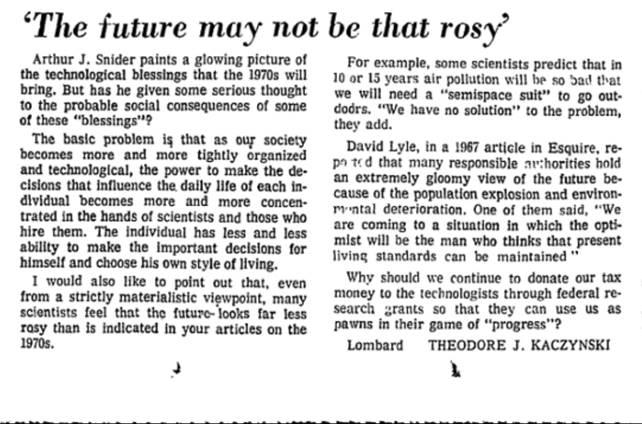
Arthur J. Snider paints a glowing picture of the technological blessings that the 1970s will bring. But has he given some serious thought to the probable social consequences of some of these “blessings”?
The basic problem is that as our society becomes more and more tightly organized and technological, the power to make the decisions that influence the daily life of each individual becomes more and more concentrated in the hands of scientists and those who hire them. The individual has less and less ability to make the important decisions for himself and choose his own style of living.
I would also like to point out that, even from a strictly materialist viewpoint, many scientists feel that the future-looks far less rosy than is indicated in your articles on the 1970s.
For example, some scientists predict that in 10 or 15 years air pollution will be so bad that we will need a “semispace suit” to go outdoors. “We have no solution” to the problem they add.
David Lyle, in a 1967 article in Esquire, reported that many responsible authorities hold an extremely gloomy view of the future because of the population explosion and environmental deterioration. One of them said, “We are coming to a situation in which the optimist will be the man who thinks that present living standards can be maintained”
Why should we continue to donate our tax money to the technologists through federal research grants so that they can use us as pawns in their game of “progress”?
THEODORE J. KACZYNSKI
Lombard
The Saturday Review Book Forum — Jan 10, 1970

I DID NOT CARE at all for Henry S. Resnik’s sympathetic treatment of Abbie Hoffman and the New Left activists.
To describe these people as if they were unselfish idealists is a bit naive. Examples of their selfishness-and self-righteousness-are abundant.
For instance, there is their tendency to condone (and practice) stealing from anyone they choose to regard as part of the establishment. There is their tendency to ignore the desire for quiet on the part of people who are disturbed by their extraordinarily loud music.
My own experience indicates to me that it is impossible to carry on even a semi-rational political discussion with these people. If you happen to disagree with some of their opinions, you are likely to be called a fascist or a racist. They seriously assert that the United States is a fascist country-which is no less unreasonable than Robert Welch’s assertion that Dwight D. Eisenhower was a conscious agent of the Communist Party. If the New Left activists ever came into power in this country, they would be fully as ready to suppress dissent as the John Birch Society would be.
Theodore J. Kaczynski,
Lombard, Ill.
Snowmobiles only provide short-term thrills — Jan 17, 1970
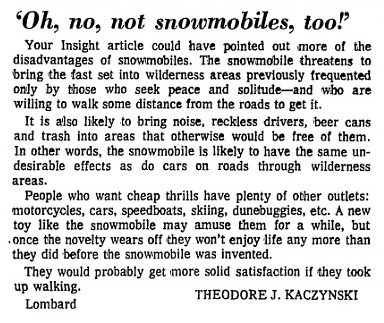
“Oh, no, not snowmobiles, too!”
Your Insight article could have pointed out more of the disadvantages of snowmobiles. The snowmobile threatens to bring the fast set into wilderness areas previously frequented only by those who seek peace and solitude-and who are willing to walk some distance from the roads to get it.
It is also likely to bring noise, reckless drivers, beer cans and trash into areas that otherwise would be free of them. In other words, the snowmobile is likely to have the same undesirable effects as do cars on roads through wilderness areas.
People who want cheap thrills have plenty of other outlets: motorcycles, cars, speedboats, skiing, dunebuggies, etc. A new toy like the snowmobile may amuse them for a while, but once the novelty wears off they won’t enjoy life any more than they did before the snowmobile was invented.
They would probably get more solid satisfaction if they took up walking.
Lombard
THEODORE J. KACZYNSKI
Letter to the Saturday Evening Review — Feb 28, 1970
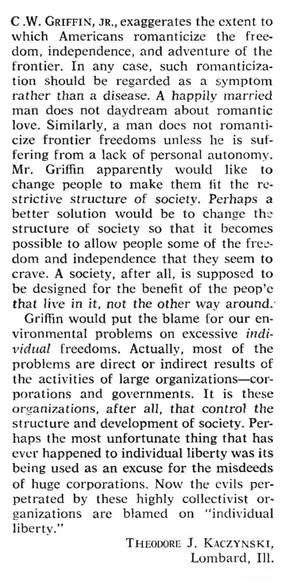
C. W. Griffin, Jr., exaggerates the extent to which Americans romanticize the freedom, independence, and adventure of the frontier. In any case, such romanticization should be regarded as a symptom rather than a disease. A happily married man does not daydream about romantic love. Similarly, a man does not romanticize frontier freedoms unless he is suffering from a lack of personal autonomy. Mr. Griffin apparently would like to change people to make them fit the restrictive structure of society. Perhaps a better solution would be to change the structure of society so that it becomes possible to allow people some of the freedom and independence that they seem to crave. A society, after all, is supposed to be designed for the benefit of the people that live in it, not the other way around.
Griffin would put the blame for our environmental problems on excessive individual freedoms. Actually, most of the problems are direct or indirect results of the activities of large organizations—corporations and governments. It is these organizations, after all, that control the structure and development of society. Perhaps the most unfortunate thing that has ever happened to individual liberty was its being used as an excuse for the misdeeds of huge corporations. Now the evils perpetuated by these highly collectivist organizations are blamed on “individual liberty.”
Theodore J. Kaczynski,
Lombard, Ill.
Cities are boring people to death — March 23, 1970
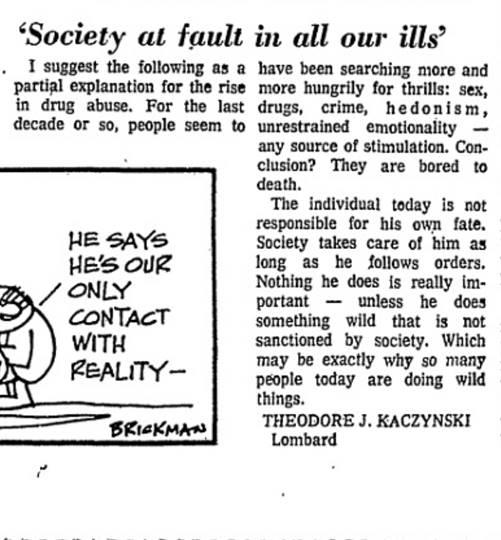
I suggest the following as a partial explanation for the rise in drug abuse. For the last decade or so, people seem to have been searching more and more hungrily for thrills: sex, drugs, crime, hedonism, unrestrained emotionally — any source of stimulation. Conclusion? They are bored to death.
The individual today is not responsible for his own fate. Society takes care of him as long as he follows orders. Nothing he does is really important — unless he does something wild that is not sanctioned by society. Which may be exactly why so many people today are doing wild things.
THEODORE J. KACZYNSKI
Lombard
Liberty Is In Danger — April 25, 1970

I fully agree with Carl Rowan’s contention that our liberty is in danger from the “law and order” advocates.
What these people fail to realize is that in order to have liberty one has to pay a price in terms of security. Organized society seems to follow a policy of always being ready to sacrifice a little bit of liberty for the sake of a little more security. As a result, our liberty is gradually eaten away, little by little.
Eventually there will be none left at all, unless at some point we are willing to finally and absolutely draw the line and agree that no more of our liberty, independence or privacy will be sacrificed no matter how great the supposed advantages of the sacrifice may seem.
Maybe the time to draw that line is now.
THEODORE J. KACZYNSKI
LOMBARD
Some politicians want to turn people into robots — May 2, 1970
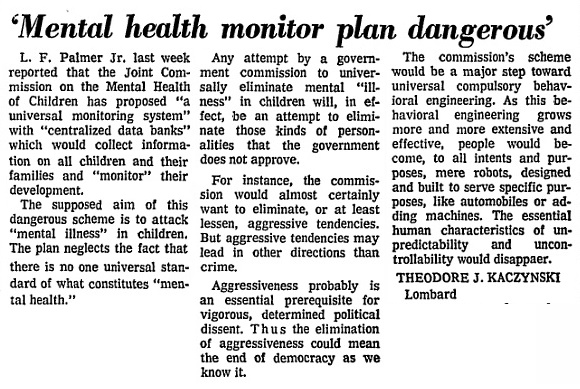
‘Mental health monitor plan dangerous’
L. F. Palmer Jr. last week reported that the Joint Commission on the Mental Health of Children has proposed “a universal monitoring system” with “centralized data banks” which would collect information on all children and their families and “monitor” their development.
The supposed aim of this dangerous scheme is to attack “mental illness” in children. The plan neglects the fact that there is no one universal standard of what constitutes “mental health.”
Any attempt by a government commission to universally eliminate mental “illness” in children will, in effect, be an attempt to eliminate those kinds of personalities that the government does not approve.
For instance, the commission would almost certainly want to eliminate, or at least lessen, aggressive tendencies. But aggressive tendencies may lead in other directions than crime.
Aggressiveness probably is an essential prerequisite for vigorous, determined political dissent. Thus the elimination of aggressiveness could mean the end of democracy as we know it.
The commission’s scheme would be a major step toward universal compulsory behavioral engineering. As this behavioural engineering grows more and more extensive and effective, people would become, to all intents and purposes, mere robots, designed and built to serve specific purposes, like automobiles or adding machines. The essential human characteristics of unpredictability and uncontrollability would disappear.
THEODORE J. KACZYNSKI
Lombard
Controlling the weather sometimes will lead to people choosing less diversity in weather in the long-term — June 13, 1970
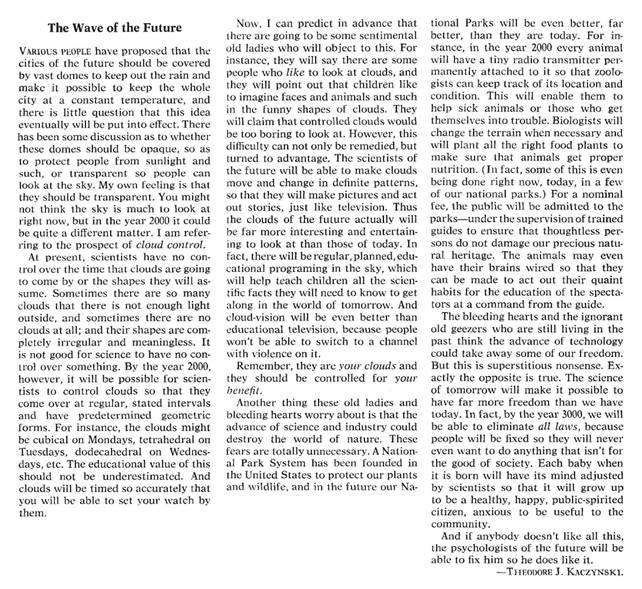
The Wave of the Future
VARIOUS PEOPLE have proposed that the cities of the future should be covered by vast domes to keep out the rain and make it possible to keep the whole city at a constant temperature, and there is little question that this idea eventually will be put into effect. There has been some discussion as to whether these domes should be opaque, so as to protect people from sunlight and such, or transparent so people can look at the sky. My own feeling is that they should be transparent. You might not think the sky is much to look at right now, but in the year 2000 it could be quite a different matter. I am referring to the prospect of cloud control.
At present, scientists have no control over the time that clouds are going to come by or the shapes they will assume. Sometimes there are so many clouds that there is not enough light outside, and sometimes there are no clouds at all; and their shapes are completely irregular and meaningless. It is not good for science to have no control over something. By the year 2000, however, it will be possible for scientists to control clouds so that they come over at regular, stated intervals and have predetermined geometric forms. For instance, the clouds might be cubical on Mondays, tetrahedral on Tuesdays, dodecahedral on Wednesdays, etc. The educational value of this should not be underestimated. And clouds will be timed so accurately that you will be able to set your watch by them.
Now, I can predict in advance that there are going to be some sentimental old ladies who will object to this. For instance, they will say there are some people who like to look at clouds, and they will point out that children like to imagine faces and animals and such in the funny shapes of clouds. They will claim that controlled clouds would be too boring to look at. However, this difficulty can not only be remedied, but turned to advantage. The scientists of the future will be able to make clouds move and change in definite patterns, so that they will make pictures and act out stories, just like television. Thus the clouds of the future actually will be far more interesting and entertaining to look at than those of today. In fact, there will be regular, planned, educational programing in the sky, which will help teach children all the scientific facts they will need to know to get along in the world of tomorrow. And cloud-vision will be even better than educational television, because people won’t be able to switch to a channel with violence on it.
Remember, they are your clouds and they should be controlled for your benefit.
Another thing these old ladies and bleeding hearts worry about is that the advance of science and industry could destroy the world of nature. These fears are totally unnecessary. A National Park System has been founded in the United States to protect our plants and wildlife, and in the future our National Parks will be even better, far better, than they are today. For instance, in the year 2000 every animal will have a tiny radio transmitter permanently attached to it so that zoologists can keep track of its location and condition. This will enable them to help sick animals or those who get themselves into trouble. Biologists will change the terrain when necessary and will plant all the right food plants to make sure that animals get proper nutrition. (In fact, some of this is even being done right now, today, in a few of our national parks.) For a nominal fee, the public will be admitted to the parks—under the supervision of trained guides to ensure that thoughtless persons do not damage our precious natural heritage. The animals may even have their brains wired so that they can be made to act out their quaint habits for the education of the spectators at a command from the guide.
The bleeding hearts and the ignorant old geezers who are still living in the past think the advance of technology could take away some of our freedom. But this is superstitious nonsense. Exactly the opposite is true. The science of tomorrow will make it possible to have far more freedom than we have today. In fact, by the year 3000, we will be able to eliminate all laws, because people will be fixed so they will never even want to do anything that isn’t for the good of society. Each baby when it is born will have its mind adjusted by scientists so that it will grow up to be a healthy, happy, public-spirited citizen, anxious to be useful to the community.
And if anybody doesn’t like all this, the psychologists of the future will be able to fix him so he does like it.
—THEODORE J. KACZYNSKI.
Why you Canadians should support population control — June 30, 1970

Wilderness
I am a U.S. citizen travelling through Canada. In reading some brochures and some splurges printed on highway maps, I could not help being struck with a certain contradiction in the Canadian attitude. On the one hand, the brochures enthuse over the glories of untouched wilderness: “Trees are everywhere, hundreds of lakes and streams remain unmapped … treasure the lonely grandeur of the big country, where nature is undisturbed.” “For more excitement, charter an aircraft into the forested wilderness beyond the end of the roads.” On the other hand, many Canadians seem to be anxious for economic exploitation of their wilderness. Some brochures brag about “blooming population”, industrial “expansion” and the extension of the roads further into the wilderness. You ought to realize that you can’t have your cake and eat it too. Preserving a few islands of wilderness in the form of parks isn’t enough as is shown by the example of the western U.S. There is still some wilderness left there, but the number of people who want to use that wilderness grows by leaps and bounds while the wilderness itself shrinks.
It gets harder and harder to escape the crowds, even when one travels several miles on foot into a designated “primitive area,” and it appears that if any wilderness is to be preserved at all, permits will eventually have to be required for travel into wilderness areas.
Try fishing in the U.S. You’ll be lucky if you catch anything. In order to have the kind of opportunities that Canada still offers, it is necessary to have really enormous areas of untamed forest and a reasonably small national population.
If I were a Canadian I would favor laws designated to discourage the growth of population and the extension of the road system. Look at it this way. The more people there are the less land and natural resources that are for each person. What many people in the U.S. are beginning to realize — now that it’s too late — is that the growth of population and industry is good for businessmen because it helps them get rich, and good for government bureaucrats because it provides impressive statistics to swell their egos, but it isn’t good for the average person. The trouble is that some Canadians don’t seem to know when they’re well off!
Stick to your traditional values — August 14, 1970

Stick to it
Editor, The Sun, Sir — Bob Hunter, in his column for July 22, appears to be saying that unless Canadians begin to accept the standards of the hippie “counter-culture,” they will fall into a “deadly trap” and suffer “d e s t r u c t i v e chaos.” He claims that the U.S. has already fallen into this trap and that it is now in a state of “civil war.”
In other words, he is threatening Canada: Accept our values or we hippies will make it so hot for you that you’ll wish you had.
As a U.S. citizen and a former resident of Berkeley, California, I can assure you that if there is a civil war in the U.S., it must be the mildest one in history. In all the “destructive chaos,” usually the only people who get hurt are the chaos-makers themselves and a few policemen.
The average person is not noticeably affected.
I taught at Berkeley during some of the worst riots there and not one of my classes was disrupted. In other words, the threats are just a lot of hot air.
The middle class has little to fear from any disruption or violence that the counter-culture may create. The thing to be feared is that the counter-culture — and its sympathizers in the mass media — may brainwash the middle class into abandoning its own moral s t a n d a r d s and becoming hippie itself.
So don’t let Bob Hunter frighten you. If you are worried about the hippies, then the best thing you can do is stick fast to your own moral standards and live up to them.
Please note: I am not advocating repressive measures against hippies. I am merely advising the middle class not to let the hippie culture influence them — especially not by threats.
THEODORE J. KACZYNSKI
463 North Ridge, Lombard, Ill.
The hypocrisy of oil propaganda — Jan 26, 1971

I quote from a pamphlet called “Alaska Recreation Guide” put out by the U.S. Department of Interior in co-operation with the Alaska Department of Natural Resources and the Alaska Department of Economic Development:
“In Alaska, the contrast of delicate beauty and savage wilderness is enough to instill in anyone’s mind that this is truly America’s playground.’ …
“But these things may not always be available for everyone. The increased population growth in our country is making increased demands on the recreation use of the land. …
“Here in this great land of Alaska there is the challenge and opportunity to preserve for the future — to profit from the mistakes and poor planning that have plagued ‘Last Frontiers’ down through history.”
Despite all this, the Department of the Interior has just recommended construction of the Alaska oil pipeline for the sake of national growth (growth being a euphemism for more crowding, more pollution, and more power for government bureaucrats). Now how do they square this action with their own words, quoted above? Maybe you can figure it out. Are they hypocrites or are they just stupid?
THEODORE J. KACZYNSKI
Lombard
Ted is fined in Justice court — May 17, 1974
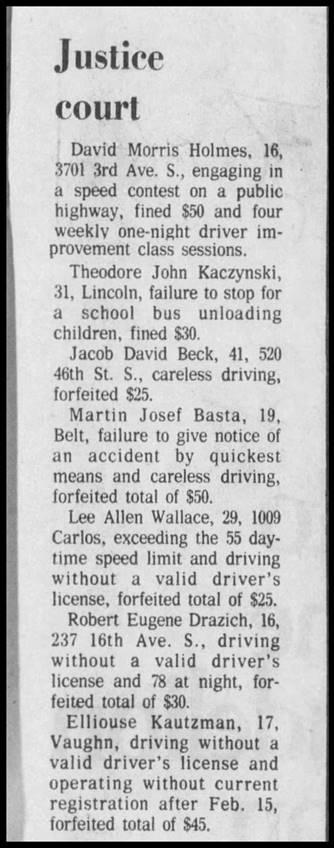
Justice court
Theodore John Kaczynski, 31, Lincoln, failure to stop for a school bus unloading children, fined $30.
“Woodsman seeks squaw” — Jan 26, 1975

Chronicle Want Ads
Introductions
Foto-Dating Club
No Computer — No Contract
Call 24 Hours 982–6666
WOODSMAN seeks squaw. Wilderness life. Write this paper Ad No. 27560.
I got six replies, but for one reason and another none of them worked out. One of them must have been written by a nymphomanic:
“I get a natural high on fresh mountain air and a long stiff cock gliding through my thatch (honey blonde to match my hair!) into my warm, wet, slippery cunt.”
“I’m lying here in the long grass, stark naked, with a finger in my snatch and my love juices running out of me onto the clover.”
Mother Earth News — 1980
While I was still in the Chicago area I advertised in the Mother Earth News for a woman interested in sharing a “very primitive life.” Got quite a few replies, but most of them were from women who either didn’t read the ad or had a strange conception of what the words “very primitive” meant. For example, one woman seemed to think that a “very primitive life” included raising quarter-horses and pure-bred showdogs. I was so disgusted with her stupidity that I sent her an answer to the following effect:
“I live in a cave, eat raw meat, and hunt bears with a club. I been combin’ the burrs out of my whiskers every mornin’ ever since I got your letter, so I should be lookin’ pretty good by the time you get here. Hurry up and come, cause I ain’t had a woman for several years now and I can’t hardly wait no longer.”
(I have a somewhat undisciplined sense of humor.)
How people will replace machines — Jan 26, 1980
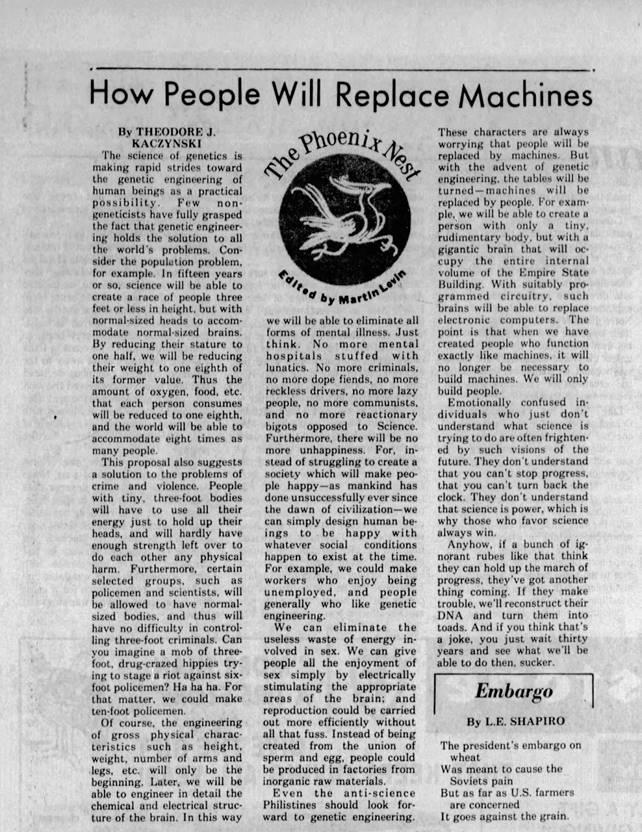
How people will replace machines
The science of genetics is rapidly advancing towards the practical possibility of genetically modifying humans. Few of us who are not geneticists have fully understood the fact that genetic engineering is the solution to all the world’s problems. Consider the population problem, for example. In about fifteen years, science will be able to create a race of people three feet or less tall, but with normal-sized heads to be able to house normal-sized brains. By reducing your height by half, you will be reducing your weight to one-eighth of your original value. Thus, the amount of oxygen, food, etc. that each person will consume will be reduced to one eighth and the world will be able to host eight times more people.
This proposal also implies a solution to the problems of crime and violence. People with tiny three-foot bodies will have to use all their energy just to keep their heads upright and will barely have enough strength left to cause physical harm to each other. In addition, certain specially selected groups, such as police officers or scientists, will be allowed to have normal-sized bodies and thus have no difficulty controlling three-foot-tall criminals. Can you imagine a mob of three-foot-tall drugged hippies trying to stage a revolt against six-foot-tall cops? Ha ha ha. In fact, ten-foot-tall police officers could be created.
Of course, the modification of crude physical characteristics such as height, weight, number of arms and legs, etc. will only be the beginning. Then we will be able to modify in detail the chemical and electrical structure of the brain. In this way we will be able to eliminate all forms of mental illness. Just think about it. No more mental hospitals full of lunatics. No more criminals, no more drug addicts, no more reckless drivers, no more communists, no more intolerant reactionaries opposed to Science. Moreover, there will be no more unhappiness. For instead of striving to create a society that makes people happy – something humanity has been trying unsuccessfully since the dawn of civilization – we could simply design human beings to be happy whatever social conditions exist at the time. For example, we could manufacture workers who enjoy being unemployed and in general people who like genetic engineering.
We can eliminate the useless expenditure of energy that sex implies. We will be able to give people all the pleasure of sex by simply electrically stimulating the right areas of their brains; and reproduction could be carried out more efficiently without all that fuss. Instead of being created by joining a sperm and an egg, people could be produced in factories from inorganic raw materials.
Even the ignorant anti-science should crave the advent of genetic engineering. These characters are always worrying that people can be replaced by machines. However, with the advent of genetic engineering, the tables will turn: machines will be replaced by people. For example, we will be able to create people with tiny and only rudimentary bodies, but with gigantic brains that will each occupy the entire volume of the Empire State Building. With their properly programmed circuits, these brains will be able to replace electronic computers. What I’m going for is that when we’ve created people that work exactly like machines, we won’t need to make any more machines. We will only manufacture people.
Emotionally confused individuals who simply don’t understand what science is trying to do are often frightened by such visions of the future. They don’t understand that you can’t stop progress, that you can’t turn back the clock. They do not understand that science is power and that is why those who are in favour of science always win.
In any case, if a bunch of ignorant patans like these think they can stop the march of progress, they are given. If they give problems, we will rebuild their DNA and turn them into toads. And if you think this is a joke, you just wait thirty years and see what we’ll be able to do then, sucker.
Warning to Berry Pickers and Mushroom Hunters! — August 6, 1989

Each year in the Lincoln Ranger District of the Helena National Forest, herbicides are sprayed on thistles and certain other plants that are considered undesirable. This is done not only along the main roads but in some logged-over areas as well. I didn’t know this until quite recently when I came across a Forest Service crew that was spraying in and around one of my favorite berry patches.
In some places I found ripe wild strawberries less than one foot from thistle that had been sprayed. It seems very probable that some of these berries were heavily contaminated with herbicide. If I had come along twenty minutes later, after the crew had left, I wouldn’t have known about the spraying and I would have eaten those berries. No notices were posted to indicate that the area had been sprayed, and as far as I know there had been no public announcement to warn people about the fact that berries or other wild edibles might be contaminated with herbicide.
Since similar spraying may occur in other ranger districts and in other national forests, and since wild berries and mushrooms growing on Forest Service lands are very popular and widely used, I think the public should be informed that they may be contaminated — perhaps heavily contaminated — with herbicides, and that it would be wise to inquire at the nearest ranger station about spraying activities before gathering any wild edibles.
The Forest Service personnel whom I consulted about this issue were very helpful in giving me information, and I would like to thank them for their courtesy. But I can see no valid excuse for the Forest Service’s failure to warn the public about herbicide spraying. — T.J. Kaczynski, Stemple Pass Road, Lincoln.
Sources
C0. 19 April 1956 — Chicago Tribune
C1. 1958 — TJK SCHOLARSHIP
C2. 1969-12-17 — CHICAGO DAILY NEWS
C3. 1970-01-10 — CHICAGO DAILY NEWS
-
Book Forum, Letters from Readers, p.35
C4. 1970-01-10 — The Saturday Review
C5. 1970-01-17 — CHICAGO DAILY NEWS
C6. 1970-02-28 — The Saturday Review
C7. 1970-03-23 — CHICAGO DAILY NEWS
C8. 1970-04-25 — CHICAGO DAILY NEWS
C9. 1970-05-02 — CHICAGO DAILY NEWS
C10. 1970-06-13 — The Saturday Review
C11. 1970-06-30 — The Edmonton Journal
C12. 1970-08-14 — THE VANCOUVER SUN
C13. 1971-01-26 — CHICAGO DAILY NEWS
C14. 1974-05-17 — JUSTICE COURT
C15. 1975-01-26 — SAN FRAN EXAMINER AD27560
C16. 1980 — Mother Earth News
C17. 1980-01-26 — HATTIESBURG AMERICAN
C18. August 6, 1989 — Missoula